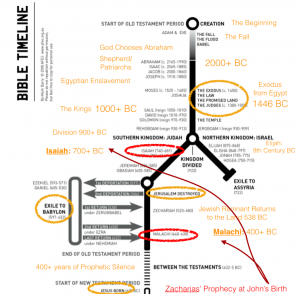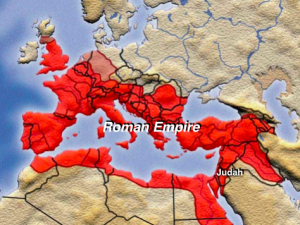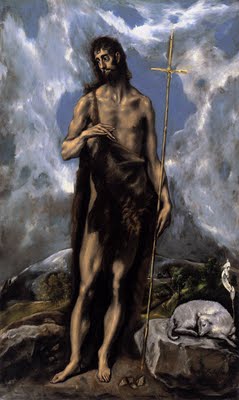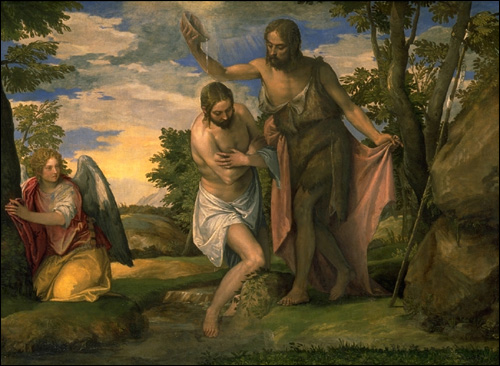 © 2014
© 2014Fellowship at Cross Creek
The Story of Sin… Part XIV:
Regaining the Story of Sin’s Big Picture…
By Joseph M. Cross
2/22/14 For just a moment, since we seemingly have covered a lot of ground through the first thirteen parts of our “Story of Sin,” let’s take a look back… Here’s the chapter by chapter overview… Part I: It Started with a Christmas Curiosity: What did the angel truly mean when he instructed Joseph to “…name the child Yah-Saves (Jesus) because he will save the people from their sins” Matt. 1:21? Parts II-IV: What does biblical scholarship say about “sin”?
Part V: The Overview of my Exhaustive NT studies concerning Sin… (Here we go…The fruits of my labors…) Part VI: The Priest Zacharias’ Prophesies that His Son John will Give the People the “Knowledge of Salvation by the Forgiveness of Sins” (Luke 1).
Parts VII-XI: John’s Preaching Fulfills Isaiah and Malachi’s Ancient Prophecies Concerning the Preparing of God’s People for the LORD’s Coming Deliverance and Forgiveness (the Gospels).
Parts VIII-X: The Reason for the People’s Powerful Response to John’s Preaching: Yah’s Original Covenant’s Blessings, Judgment and Forgiveness (Deut. 28-30).
Part XII: Elijah’s Voice, John, Blazes a Trail for God’s People and God’s Deliverance to Meet (the Gospels).
Part XIII: John’s Great Declaration: God’s Slaughtered Lamb—the One Who Stands Before Us–Will Take Away the Sins of the World! (Is. 53; John 1.) Now here are the summaries for the first thirteen parts or chapters… Part I: It all began for me with a Christmas curiosity… 1) What did the angel really mean when he commanded the distraught Joseph in a dream NOT to divorce his now-pregnant betrothed, Mary, because she was about to bear a child which couldn’t possibly be his, but instead instructed him to name the child that had been miraculously conceived by God’s Spirit: “…Yah (or God) Saves because he will save the people from their sins” (Matt. 1:21) and… 2) What might Joseph have understand the Lord’s angel to mean by his instructions to Joseph? In other words, what did he understand by “…he will save the people from their sins”? How would this child “save the people from their sins”? What sins? The nation’s sins? Joseph’s sins? All mankind’s sins? And what was a “sin” to Joseph? And why was this all so important? Why did the people need to be saved from their sins? I mean some of us have heard this innumerable times in our lives; sadly, others have NEVER heard this. I wanted to approach this fresh—not two thousand years later, but in the moment. And why were the contents of this dream enough for Joseph to change his mind concerning his intentions to divorce Mary? Why was this statement…this command..so critical…so pivotal…not only for Joseph, and later, to for many others, but also by historical extrapolation…for us even today? What does it mean to be “saved from sin”? So I went back to the beginning. First, I looked at how biblical scholarship–beginning with Classical Greek, as well as, the Hebrew and Greek Old Testaments–informed the meaning of sin for the New Testament authors. Then, I took a look for myself. I looked up every reference–noun, verb, adjective and adverb (almost 300 of them) –in context in the New Testament. What I discovered was incredible. What we, 2,000 years later, take for granted (having both read and heard the Christmas story and the purpose of Christ’s birth and sacrifice many times over) including the angel’s reason to Joseph for naming the child Yah-Saves 1) may not have been as clear as when it was first spoken to Joseph, and 2) tucked away within the meaning of this incredible angelic pronouncement was not only the key to: a) every man’s eternal deliverance from sin after death, including death itself, but b) the timeless keys to gradually being delivered through or from what each of us struggles with perhaps every few seconds of every day.. or hundreds of times… every day–that is our struggle with sin’s imperfection and failure…including every sin, error, mistake, injustice, perversion, crime, hurt and harm imaginable…I mean everything! Parts II-IV: What did scholarship say about the ancients view of sin?¹ 1) The Greeks ultimately define sin as injustice against society’s norms. In their battle with sin, including their attempt to overcome both their divinely ordained fate, as well as, their lustful passions, they will employ the man’s tools of religious ritual, overcoming ignorance and good deeds–not bad as tools go, but as we will find out later, not near enough for the immense task of overcoming sin’s imperfection! 2) When it comes to the Hebrew Old Testament, via the Mosaic Law or Covenant, the meaning of sin gets a legal-Spiritual boost: a) sin is not only a legally-defined offense against man, but God as well. In other words, when we sin, whether it be against another person or not, it is always a crime against heaven or an offense against a holy, perfect and righteous Creator; b) because sin, like a deadly virus, can be highly contagious and deadly, when a community deals with sin, it is not just a punitive measure directed towards the sinner, but a salvific event for the entire community; c) the Law employs both punishment, as well as, ritual sacrifice to both atone for and stem sin’s deadly contagion; d) despite the Law’s presence, the history of Israel is one of massive sin, or Spiritual apostasy, ultimately leading to, as defined in their covenant with God, God’s crushing judgment, including the nation’s division, destruction and temporary exile; e) Israel’s only hope in its deadly struggle with sin is foreshadowed in Is. 53’s Song of the Suffering Servant. 3) After Judah’s crushing Babylonian defeat and exile, as opposed to returning to a genuine Spiritual righteousness, a) over time, an artificial or fake, pseudo-rabbinical righteousness, resulting in a super-legalism and hypocrisy, arises in an attempt to cheat or fake out both God and man concerning the true biblical meaning of what is true righteousness and true sin; b) added to the Law’s punishment and sacrifices in dealing with sin, are good works and suffering, including martyrdom; c) the rabbis teach that Messiah will come and eradicate all sin. 4) As opposed to completely avoiding ritually unclean sinners, including non-Jews or Gentiles, as the rabbis do in their attempt to remain ritually pure or superficially clean or righteous, Jesus (Yah-Saves) turns over the religious apple cart by befriending sinners! Part V: An Overview of My Own NT Word Study of Sin… While studying what scholars have said about the ancients’ view of sin was enlightening, my curiosity was piqued, so I decided to do my own NT word study on sin. In researching the NT’s over 300 references to sin, I discovered or sifted through several layers crucial to not only our understanding of what sin was, but how Yah-Saves saves or delivers us, both in the now and in the forever, from our sins. 1) If the Jews were thinking about being saved from their sins, as opposed to an individual needing to be forgiven of his or her personal sins, there seems to be rather an expectation of a national deliverance from Judah’s past sins. 2) In turn, when legalistic, hypocritical Jewish religious leaders in Jesus’ day reject Yah-Saves’ offer of salvation because it differs from their own national expectation of deliverance from sin, paradoxically, they will end up ONLY adding to their many sins. 3) Like a meteor crashing to earth…the story and miracle of how the whole world comes to be included in Yah-Saves’ offer of salvation from sin is truly remarkable. 4) Incredibly, the story of being saved from Sin doesn’t end with initial faith or trust, as some seemingly so over-emphasize. Initial trust for one’s eternal deliverance from sin is only the beginning of a natural, incredible, Spiritual and developmental process of being saved from sin; 5) Shielded by Yah-Saves human-divine sacrifice for sin, God empowers his now-eternally-delivered-from-sin children with the power and truth to be delivered from sin in the here and now—the Spirit of God. ( So here we go…The fruits of my labors…The NT Story of Sin…) Part VI: The Priest Zacharias’ Prophesies that His Son John the Baptist will Give to the People the “Knowledge of Salvation by the Forgiveness of Sins” Luke 1. Only a few months prior to the angel of the Lord revealing to Joseph that Mary’s child will “save the people from their sins,” the angel Gabriel had appeared and revealed to a Jewish priest named Zacharias that the son about to be born to him and his elderly wife, Elizabeth–John the Baptist–would fulfill several ancient prophecies: Luke 1:13 But the angel said to him, “Do not be afraid, Zacharias, for your petition has been heard, and your wife Elizabeth will bear you a son, and you will give him the name John. 14 You will have joy and gladness, and many will rejoice at his birth. 15 For he will be great in the sight of the Lord; and he will drink no wine or liquor, and he will be filled with the Holy Spirit while yet in his mother’s womb. 16 And he will turn many of the sons of Israel back to the Lord their God. 17 It is he who will go as a forerunner before Him in the spirit and power of Elijah, to turn the hearts of the fathers back to the children, and the disobedient to the attitude of the righteous, so as to make ready a people prepared for the Lord.” (Luke 1:13ff alluding to Micah 4:5-6; 3:1: Is. 40:3ff). When John is born, inspired of God, Zacharias, once-still tongued, now breaks forth confirming Gabriel’s previous announcement: “You my son will be a prophet of the Most High because you will go before the Lord to prepare his ways—to give his people knowledge of salvation by the forgiveness of their sins” (Luke 1:76-77). Luke’s intentions are clear here. Both the angel Gabriel and the priest Zacharias are announcing and prophesying that Zacharias’ son, John, is Isaiah 40’s “crying voice,” as well as, Malachi 3’s “messenger” and Malachi 4’s “Elijah” who will go before the Lord to prepare God’s people for the Lord’s appearing and his salvation or deliverance via the forgiveness from their sins. In addition, Zacharias ties THIS “salvation” or deliverance to not only to the rescue provision of Yah’s ancient covenant with Israel (vv. 71-74; Deut. 30) but this “national” salvation or deliverance for God’s people comes through a “horn” or “strength” arising from “the house (or line) of (King) David” (v. 69) who will deliver God’s people from “our enemies and the hand of all who hate us” (vv. 71, 74). Several looming considerations arise from John’s birth: 1) Is Yah God about to nationally save or deliver his people from their oppressors, in this case, Rome, and 2) what is the role of the people’s release or “forgiveness” from their sins within this salvation? 3) Is this both an imminent national salvation being offered to God’s people predicated upon a national repentance and forgiveness, or something more going on here, because otherwise, from Zacharias’ prophesy, one would assume both a national forgiveness and national salvation? Now how the individual plays his or her role within this national forgiveness and salvation is yet another matter to consider. For example, how many people, or what percentage of the population does it take to quantify God’s people as having “fathers’ hearts turned back to their children and children’s hearts turned back to their fathers” presumably, in a study, teaching and learning of her covenant with Yah God once again (Mal. 4:5-6; Luke 1:13-17; Deut. 6:4ff)? Parts VII and XI: Zacharias’ Son, John the Baptist, Fulfills the Ancient Prophesies in Preparation of the LORD’s Coming Deliverance… All four gospel writers, along with Jesus himself, confirm that a generation later when Zacharias’ son John begins to preach repentance, confession and baptism in preparation for the LORD’s coming forgiveness and salvation, he is fulfilling the ancient OT prophesies of Isaiah and Malachi (Matt. 3:1ff; 11:2ff; 17:9ff; Mark 1:1ff; Luke 1:13ff; 3:1ff; John 1:18ff). What do those prophecies teach specifically? Malachi writes: “I am going to send My messenger, and he will clear the way before Me” (Mal. 3:1) and “Behold, I am going to send you Elijah the prophet before the coming of the great and terrible day of the LORD. He will restore the hearts of the fathers to their children and the hearts of the children to their fathers, so that I will not come and strike the land with a curse.” Mal. 4:5-6. (No doubt, a thousand years after Yah and Israel ratified their covenant together at Sinai after her exodus out of Egypt, Malachi has provisions of that covenant in mind…See the Book of Deuteronomy.) “Comfort, O comfort My people,” says your God. “Speak kindly to Jerusalem; and call out to her, that her warfare has ended, that her iniquity has been removed, that she has received of the Lord’s hand double for all her sins.” A voice is calling, “Clear the way for the Lord in the wilderness; make smooth in the desert a highway for our God.” Is. 40:1-3. (Three hundred years before Malachi’s Old Testament ending prophecy, the prophet Isaiah, alluding to the same covenant provisions, speaks of both Yah’s forgiveness and reconciliation with Jerusalem.) So if John’s preaching of repentance and baptism prepares the way for the Lord’s coming salvation, what had God’s people done that was so terribly wrong or why did they need forgiving and saving in the first place? Parts VIII-X: The Reason for the People’s Powerful Response to John’s Preaching: Yah’s Original Covenant’s Blessings, Judgment and Forgiveness (Deut. 28-30). Seven centuries before Isaiah’s prophecy of God’s forgiveness and compassion and fourteen centuries before John’s preparatory preaching of repentance, confession and baptism, Yah God had graciously and wondrously rescued his nation-people, bride Israel from her enslavement within the nation of Egypt. Then after saving his bride, the saving groom, Yah, took his bride out into the desert and entered into a very sacred covenant with her (See the Book of Exodus). Via a vigilant observance of their Law or constitution, Yah promised to be her Divine Protector, if she, as a bride, would remain to her groom, Yah (see Ex. 19-20 and Deut. 28). But despite the bride’s wondrous redemption, her miraculous return to her fathers’ promised lands, her inspired covenants, as well as, Yah’s active presence, daily provision and protection, his many warnings, disciplines and deliverances, nothing works. Truly, sin is infectious. The adored bride, unable to harness her willful, sinful indulgences despite her covenant, prostitutes herself to the gods and perverted pagan values of her surrounding neighbors. She becomes one of them. Even under the leadership of the kings she asked for, to keep her more accountable, she utterly and repeatedly fails to be faithful to her covenant vows to Yah, and like a sow, she wallows in the cool mud of her Spiritual and moral apostasies which include forbidden idol worship, male shrine prostitution and child sacrifice. Finally, true to his covenant (Deut. 28-30), Yah the groom allows the crushing hammer of his divine justice to fall. Her ten northern tribes are crushed and interspersed among the nations, never to be heard from again. A century later, portions of her two southern tribes are carried off into Babylonian captivity. Then several generations later, Yah, once again, true to his covenant (Deut. 30) brings back a repentant national remnant from Babylon to reseed her desolated lands. And while she will rebuild her temple and Jerusalem’s walls, for over five centuries, she will remain but a mere shadow of her former glory. Now, five painful centuries later after her return to her promised Land, a voice of one crying in the wilderness cries out that she is to prepare the way for the Lord’s coming salvation and forgiveness. The time for the broken, humbled bride’s incredibly long, great and mournful sorrow has finally come to an end. Isaiah’s “Crying Voice” announces to Judah that her Savior-Groom, Yah, once again, is coming, much as he had 1400 years before, to rescue or redeem his wayward bride from her sorrow and oppression. Yah is once again offering his bride his glory. Amazing!
 Part XII: Isaiah 40’s “Crying Voice,” Malachi’s “Messenger Elijah” and Zacharias’ son, John the Baptist, Now Blazes a Mighty Trail through the Wilderness of Man’s Sinful Imperfection in Order to Prepare God’s People for the LORD’s Appearing and Redemption.
The Voice’s message is simple…turn from sin; turn from your Spiritual error…your approach to living that stands as an offense against your holy Groom…from a life that takes little consideration of God, his truth, his laws, his moral standards to a life that embraces God.
How would they do this? 1) particularly addressed to the religious leaders, stop hiding your sin or Spiritual imperfection via fake religious ritual—hypocrisy. In other words, be real; don’t pretend to love God when you really don’t; 2) Come clean and confess your Spiritual flaws and imperfections; confess a corrupted heart; tell the truth..the evil, ugly truth; 3) then to anchor this inward change of heart, as an outward symbol of the internal cleansing that the heart and mind are experiencing, be symbolically washed or baptized with water…so that all the world can see, bear witness to and possibly hold you accountable for in the future; 4) And what does this sustained change look like? Like your returning redeeming husband, Yah, be righteous, just and merciful. Play fair…be fair… and then share. Do right and be generous. Hold the higher ground. Be the better man! Act, live, think, pray, trust and hope as if God truly exists with you (Matt. 3:1ff; Mark 1:1ff: Luke 3:1ff). And in doing so, your lives, hearts and minds will be Spiritually prepared to recognize and receive your long-awaited redemption–the coming of your King along with his gracious forgiveness and salvation, not only from the consequences of your choices…foreign domination and oppression..which I suspect, like a child seeking to be relieved from their seemingly endless, extended stay within timeout, God’s people will perhaps be most focused on, but, even greater–the ultimate deliverance and redemption from what causes man’s sin to begin with.
Part XII: Isaiah 40’s “Crying Voice,” Malachi’s “Messenger Elijah” and Zacharias’ son, John the Baptist, Now Blazes a Mighty Trail through the Wilderness of Man’s Sinful Imperfection in Order to Prepare God’s People for the LORD’s Appearing and Redemption.
The Voice’s message is simple…turn from sin; turn from your Spiritual error…your approach to living that stands as an offense against your holy Groom…from a life that takes little consideration of God, his truth, his laws, his moral standards to a life that embraces God.
How would they do this? 1) particularly addressed to the religious leaders, stop hiding your sin or Spiritual imperfection via fake religious ritual—hypocrisy. In other words, be real; don’t pretend to love God when you really don’t; 2) Come clean and confess your Spiritual flaws and imperfections; confess a corrupted heart; tell the truth..the evil, ugly truth; 3) then to anchor this inward change of heart, as an outward symbol of the internal cleansing that the heart and mind are experiencing, be symbolically washed or baptized with water…so that all the world can see, bear witness to and possibly hold you accountable for in the future; 4) And what does this sustained change look like? Like your returning redeeming husband, Yah, be righteous, just and merciful. Play fair…be fair… and then share. Do right and be generous. Hold the higher ground. Be the better man! Act, live, think, pray, trust and hope as if God truly exists with you (Matt. 3:1ff; Mark 1:1ff: Luke 3:1ff). And in doing so, your lives, hearts and minds will be Spiritually prepared to recognize and receive your long-awaited redemption–the coming of your King along with his gracious forgiveness and salvation, not only from the consequences of your choices…foreign domination and oppression..which I suspect, like a child seeking to be relieved from their seemingly endless, extended stay within timeout, God’s people will perhaps be most focused on, but, even greater–the ultimate deliverance and redemption from what causes man’s sin to begin with.
 Sadly, except for a precious few that eventually will become a great many (Christ’s church or “called out” by the Spirit), because of this former emphasis of redemption–the redemption from the consequences of our sin…or timeout, in this case Roman domination…which God will do someday… most of God’s people will miss Yah’s greater offer of redemption from what causes them to sin in the first place. Thus two redemptions are being offered here, but because we all want relief from our pain–the other guy’s injustice–we miss the greater deliverance…relief from ourselves…and our own painful choices. Blindly, we see the problem as others, while God, logically, knows that “we” ARE a part of the others! In other words, I am the “others” to someone else. Thus redemption from sin MUST begin with ME!
Amazing, when you finally see it, isn’t it?
Part XIII: John has a Surprising Announcement Concerning his prophetic giving of God’s “knowledge of salvation by the forgiveness of sins”: According to Isaiah’s Song, God’s Slaughtered Lamb Must First Take Away the Sinful Imperfections of the World (Is. 53; John 1).
Finally, after having made much headway in constructing his repentant road through the barren wilderness of man’s sin in order to Spiritually prepare the people’s hearts NOT TO MISS Yah’s coming deliverance, John is confronted with the person of Yah-Saves (or God’s deliverance) coming towards him. The gospel writer, John (a different John, the disciple of Jesus) records the exact words of John the Baptist, our OT “Crying Voice,” “Messenger” and figurative “Elijah.” He announces to the world…THIS IS God’s Son…this is God in the flesh, God incarnate…this is God’s Salvation from Sin…man’s salvation from sinful imperfection…this is “the Lamb of God which takes away the sins of the world!” (John 1:29, 35).
What does John the Baptist mean by his inspired declaration? With perhaps the whole OT sacrificial system serving as a gigantic backdrop, John the Baptist seems to be referring to: 1) the Passover Lamb (Ex. 12; John 19:13; 1 Cor. 15:7) or, 2) at the very least, Is. 53’s song of the slaughtered lamb.²
What should seem incredibly apparent to anyone who has ever read Isaiah 53’s song of the slaughtered lamb is a virtual lighthouse of immense proportions, and whose truthful light not only shines throughout the universe for all Creation to take notice of, come in search of and joyously be enlightened by, but also serves as a vast bridge, linking the Old with the New Covenant or Testaments.
Isaiah 53 ties the entire Bible together. Over seven hundred years before Yah-Saves’ appearing, Isaiah song, using 13 different statements in 12 verses, will clearly declare that God or Yah intends to save or deliver his sinful, fallen bride from her devastatingly contagious and deadly imperfection via the guilt offering of a perfect slaughtered lamb.
At this point in the narrative, perhaps it is premature to explain exactly how this will take place or what this sacrifice looks like, but make no mistake about it, Isaiah’s “Voice” and Malachi’s “Elijah-type Messenger,” via his metaphor of the slaughtered Lamb of God, has now cut down the final impediment within the wilderness of sin’s imperfection separating the LORD’s people from her deliverance. The path is now clear—the repentant standing before and in the presence of God’s eternal sacrificial lamb. If that doesn’t give you goose bumps, I am not sure what will?
Your servant,
Sadly, except for a precious few that eventually will become a great many (Christ’s church or “called out” by the Spirit), because of this former emphasis of redemption–the redemption from the consequences of our sin…or timeout, in this case Roman domination…which God will do someday… most of God’s people will miss Yah’s greater offer of redemption from what causes them to sin in the first place. Thus two redemptions are being offered here, but because we all want relief from our pain–the other guy’s injustice–we miss the greater deliverance…relief from ourselves…and our own painful choices. Blindly, we see the problem as others, while God, logically, knows that “we” ARE a part of the others! In other words, I am the “others” to someone else. Thus redemption from sin MUST begin with ME!
Amazing, when you finally see it, isn’t it?
Part XIII: John has a Surprising Announcement Concerning his prophetic giving of God’s “knowledge of salvation by the forgiveness of sins”: According to Isaiah’s Song, God’s Slaughtered Lamb Must First Take Away the Sinful Imperfections of the World (Is. 53; John 1).
Finally, after having made much headway in constructing his repentant road through the barren wilderness of man’s sin in order to Spiritually prepare the people’s hearts NOT TO MISS Yah’s coming deliverance, John is confronted with the person of Yah-Saves (or God’s deliverance) coming towards him. The gospel writer, John (a different John, the disciple of Jesus) records the exact words of John the Baptist, our OT “Crying Voice,” “Messenger” and figurative “Elijah.” He announces to the world…THIS IS God’s Son…this is God in the flesh, God incarnate…this is God’s Salvation from Sin…man’s salvation from sinful imperfection…this is “the Lamb of God which takes away the sins of the world!” (John 1:29, 35).
What does John the Baptist mean by his inspired declaration? With perhaps the whole OT sacrificial system serving as a gigantic backdrop, John the Baptist seems to be referring to: 1) the Passover Lamb (Ex. 12; John 19:13; 1 Cor. 15:7) or, 2) at the very least, Is. 53’s song of the slaughtered lamb.²
What should seem incredibly apparent to anyone who has ever read Isaiah 53’s song of the slaughtered lamb is a virtual lighthouse of immense proportions, and whose truthful light not only shines throughout the universe for all Creation to take notice of, come in search of and joyously be enlightened by, but also serves as a vast bridge, linking the Old with the New Covenant or Testaments.
Isaiah 53 ties the entire Bible together. Over seven hundred years before Yah-Saves’ appearing, Isaiah song, using 13 different statements in 12 verses, will clearly declare that God or Yah intends to save or deliver his sinful, fallen bride from her devastatingly contagious and deadly imperfection via the guilt offering of a perfect slaughtered lamb.
At this point in the narrative, perhaps it is premature to explain exactly how this will take place or what this sacrifice looks like, but make no mistake about it, Isaiah’s “Voice” and Malachi’s “Elijah-type Messenger,” via his metaphor of the slaughtered Lamb of God, has now cut down the final impediment within the wilderness of sin’s imperfection separating the LORD’s people from her deliverance. The path is now clear—the repentant standing before and in the presence of God’s eternal sacrificial lamb. If that doesn’t give you goose bumps, I am not sure what will?
Your servant,jc Next Time: Part XV…Yah-Saves, the Lamb of God Begins to Foreshadow his Sacrifice as He Forgives the Sins of the People (Mark 2). Notes… ¹My primary source for understanding what the ancients taught about sin was “Sin,” New International Dictionary of New Testament Theology vol. 3, pp. 573-587; Colin Brown ed.; Zondervan; 1978. My goal was not to be scholarly within this study, but merely to give the reader a basic, but credible summarized reference or starting point to begin our study of sin—in other words, what does NT scholarship in general say about the ancients’ view of the meaning of sin…or the words used for sin? ²Bible Knowledge Commentary: New Testament ed., p. 276; ed. by Walvoord and Zook; David C. Cook; 1989.





